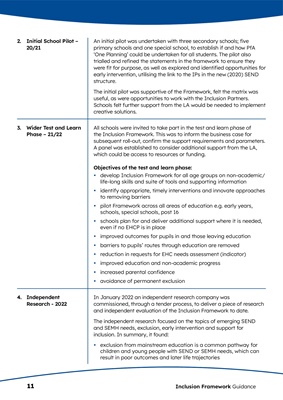
11 Inclusion Framework Guidance
2. Initial School Pilot -
20/21
3. Wider Test and Learn
Phase - 21/22
4. Independent
Research - 2022
An initial pilot was undertaken with three secondary schools; five
primary schools and one special school, to establish if and how PfA
'One Planning' could be undertaken for all students. The pilot also
trialled and refined the statements in the framework to ensure they
were fit for purpose, as well as explored and identified opportunities for
early intervention, utilising the link to the IPs in the new (2020) SEND
structure.
The initial pilot was supportive of the Framework, felt the matrix was
useful, as were opportunities to work with the Inclusion Partners.
Schools felt further support from the LA would be needed to implement
creative solutions.
All schools were invited to take part in the test and learn phase of
the Inclusion Framework. This was to inform the business case for
subsequent roll-out, confirm the support requirements and parameters.
A panel was established to consider additional support from the LA,
which could be access to resources or funding.
Objectives of the test and learn phase:
y develop Inclusion Framework for all age groups on non-academic/
life-long skills and suite of tools and supporting information
y identify appropriate, timely interventions and innovate approaches
to removing barriers
y pilot Framework across all areas of education e.g. early years,
schools, special schools, post 16
y schools plan for and deliver additional support where it is needed,
even if no EHCP is in place
y improved outcomes for pupils in and those leaving education
y barriers to pupils' routes through education are removed
y reduction in requests for EHC needs assessment (indicator)
y improved education and non-academic progress
y increased parental confidence
y avoidance of permanent exclusion
In January 2022 an independent research company was
commissioned, through a tender process, to deliver a piece of research
and independent evaluation of the Inclusion Framework to date.
The independent research focused on the topics of emerging SEND
and SEMH needs, exclusion, early intervention and support for
inclusion. In summary, it found:
y exclusion from mainstream education is a common pathway for
children and young people with SEND or SEMH needs, which can
result in poor outcomes and later life trajectories